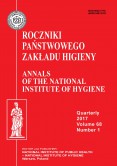Rocz Panstw Zakl Hig 2014, 65(3): 205-212
Adaptation of a neurobehavioral test battery for Thai children.
[Adaptation of a neurobehavioral test battery for Thai children.]
ABSTRACT
Background. Exposure to neurotoxicants is a world wide problem with significant health implications for child develop¬ment. In spite of higher neurotoxicant exposures, many developing countries do not have established neuropsychological instruments.
Objective. This study evalauted the adaptation and reliability of a computer and examiner administered Behavioral Assess¬ment and Research System (BARS) that includes tests of motor speed and dexterity, attention, memory, and visuospatial coordination for use in Thailand.
Material and methods. To assess test-retest and alternate form reliability, BARS was administered to 24 healthy, 6-8 year old urban Thai children during two testing sessions two weeks apart. A comparison group of 29 healthy, rural Thai children of similar age and sex completed the BARS as part of another study and comprised a comparison group.
Results. Test-retest reliabilities for tests without alternate forms ranged from 0.41 to 0.77, but reliabilities were lower for tests with alternate forms (0.11 to 0.83). Paired t-tests revealed few significant differences in group performance between test administrations. Performance of urban Thai participants was compared to 29 rural Thai participants of similar age and sex. Parental education was significantly greater for urban vs. rural participants, resulting in signficant differences in performance on tests of motor speed.
Conclusions. This study supports the use of BARS for epidemiologic studies of neurotoxicants in Thailand, but highlights the sensitivity of these tests to differences in parental education and the need for improved alternate test forms.
STRESZCZENIE
Wprowadzenie. Narażenie na substancje neurotoksyczne jest problemem ogólnoświatowym mającym istotne konsekwencje zdrowotne dla rozwoju dzieci. Wiele państw rozwijających się nie przygotowało narzędzi do badań neuropsychologicznych, mimo występowania dużego narażenia na substancje o działaniu neurotoksycznym.
Cel badań. W badaniach przeprowadzonych przez ankieterów z zastosowaniem komputerów oceniono przystosowanie i wiarygodność testu Behavioral Assessment and Research System (BARS), który obejmuje badanie szybkości i zręczności motorycznej, uwagi, pamięci i koordynacji wzrokowej w celu zastosowania w Tajlandii.
Materiał i metody. W celu oceny wiarygodności testu BARS metodą test-retest i zapisu alternatywnego poddano badaniu 24 zdrowych dzieci tajlandzkich w wieku 6-8 lat zamieszkujących w mieście. Ponowne badania przeprowadzono w odstępie 2 tygodni. Grupę porównawczą stanowiło 29 zdrowych dzieci mieszkających na wsi
Wyniki. Wiarygodność poszczególnych skal badana metodą test-retest rozciągała się od 0,41 do 0,77. Wiarygodność była niższa w przypadku metody zapisu alternatywnego (0,11 do 0,83). Test t dla zmiennych połączonych wykazał nieliczne różnice pomiędzy wynikami grupy w dwóch badaniach. Porównanie wyników uzyskanych przez dzieci tajlandzkie miesz¬kające w miastach i na wsi wykazało wpływ wykształcenia rodziców, które było znacząco wyższe u tych pierwszych.
Wnioski. Badania potwierdzają użyteczność testu BARS do badań epidemiologicznych substancji neurotoksycznych w Taj¬landii, ale uwydatniły czułość testu na różnice w wykształceniu rodziców i potrzebą polepszenia zapisu alternatywnego testu.
Liczba pobrań: 1916


